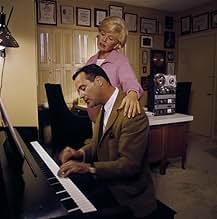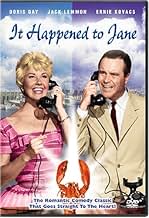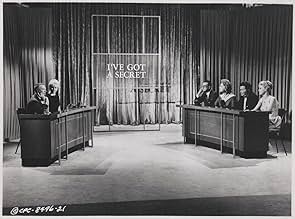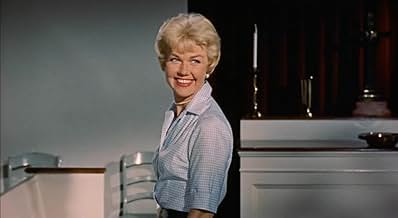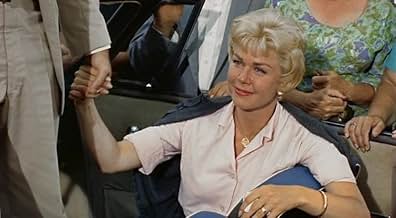VALUTAZIONE IMDb
6,5/10
3293
LA TUA VALUTAZIONE
Jane Osgood gestisce un'attività di aragosta, sostenendo i suoi due figli piccoli. La disattenzione del personale della ferrovia rovina il carico, così con il suo avvocato George, Jane fa ca... Leggi tuttoJane Osgood gestisce un'attività di aragosta, sostenendo i suoi due figli piccoli. La disattenzione del personale della ferrovia rovina il carico, così con il suo avvocato George, Jane fa causa a Harry Foster Malone, direttore della linea.Jane Osgood gestisce un'attività di aragosta, sostenendo i suoi due figli piccoli. La disattenzione del personale della ferrovia rovina il carico, così con il suo avvocato George, Jane fa causa a Harry Foster Malone, direttore della linea.
Max Showalter
- Selwyn Harris
- (as Casey Adams)
Robert Paige
- Bob Paige - Host 'The Big Payoff'
- (as Bob Paige)
Recensioni in evidenza
This has to be the most underrated and overlooked of the comedies from Doris Day's later career. I'm surprised at the relatively low score it has received here on IMDb, as it's a really fun and entertaining movie (particularly following the unfortunate Tunnel of Love she appeared in the prior year).
Rather than the lush, opulent interiors and wardrobe we usually look forward to in a Day comedy, this one is stunning for its exteriors. Filmed in New England in the summer of 1958, the film exudes idyllic small town splendor. Day plays Jane Osgood, a widowed entrepreneur (all "independent" women in 1950's TV or movies are either widows, as in Lucille Ball's later television work, or impossible-to-marry shrews like Joan Crawford in The Best of Everything). Osgood operates a budding lobster business, and when an expensive shipment is ruined by the laxity of the railroad, she takes on railroad magnet Harry Foster Malone in a highly publicized David & Goliath lawsuit. Ernie Kovacs is particularly memorable in his portrayal of Harry Foster Malone, an obvious and amusing allusion to Orson Welles' Charles Foster Kane, which was of course an allusion to William Randolph Hurst. In her legal battle, Osgood enlists the aid of local attorney and old friend George Denham, the man she's "supposed" to be with and just doesn't realize it, played well by a young Jack Lemmon. Throughout the course of the story, the film seems to at regular intervals inject some rather insightful observations on a multitude of thought-provoking topics, including the place and nature of democracy in a capitalist society, the overwhelming power wielded by big business, even the (at the time) ever expanding place of television in our lives and its ability to influence and inform. And all of this in a comedy!
The only negative I can think of is the inclusion of perhaps the worst musical number ever put on film. Jane Osgood is the den mother of the local boy-scout troop (naturally) and at the camp out in her back yard she leads them in a sing-a-long of the single most stupid, dreadful and endless song you ever heard in your life. "Be Prepared" well they warned you! It starts out as amusingly bad, but then seems to last about fifteen or twenty minutes until you think you'd rather take your own life than hear one more note. Any self-respecting boy scout over the age of five would kick you right in the nuts if you asked him to sing this wretched torturous piece of nonsense.
This aside (it is unfortunately not that uncommon in films of this era), this film benefits well from a strong, well written script and an excellent cast. It is actually much more intelligent and heart-warming than any of the Doris Day-Rock Hudson pairings, and while it is a very different kind of film, it can hold its own against any of those. Highly recommended, but be prepared to hit the "mute" button when those boy-scouts start singing!
Rather than the lush, opulent interiors and wardrobe we usually look forward to in a Day comedy, this one is stunning for its exteriors. Filmed in New England in the summer of 1958, the film exudes idyllic small town splendor. Day plays Jane Osgood, a widowed entrepreneur (all "independent" women in 1950's TV or movies are either widows, as in Lucille Ball's later television work, or impossible-to-marry shrews like Joan Crawford in The Best of Everything). Osgood operates a budding lobster business, and when an expensive shipment is ruined by the laxity of the railroad, she takes on railroad magnet Harry Foster Malone in a highly publicized David & Goliath lawsuit. Ernie Kovacs is particularly memorable in his portrayal of Harry Foster Malone, an obvious and amusing allusion to Orson Welles' Charles Foster Kane, which was of course an allusion to William Randolph Hurst. In her legal battle, Osgood enlists the aid of local attorney and old friend George Denham, the man she's "supposed" to be with and just doesn't realize it, played well by a young Jack Lemmon. Throughout the course of the story, the film seems to at regular intervals inject some rather insightful observations on a multitude of thought-provoking topics, including the place and nature of democracy in a capitalist society, the overwhelming power wielded by big business, even the (at the time) ever expanding place of television in our lives and its ability to influence and inform. And all of this in a comedy!
The only negative I can think of is the inclusion of perhaps the worst musical number ever put on film. Jane Osgood is the den mother of the local boy-scout troop (naturally) and at the camp out in her back yard she leads them in a sing-a-long of the single most stupid, dreadful and endless song you ever heard in your life. "Be Prepared" well they warned you! It starts out as amusingly bad, but then seems to last about fifteen or twenty minutes until you think you'd rather take your own life than hear one more note. Any self-respecting boy scout over the age of five would kick you right in the nuts if you asked him to sing this wretched torturous piece of nonsense.
This aside (it is unfortunately not that uncommon in films of this era), this film benefits well from a strong, well written script and an excellent cast. It is actually much more intelligent and heart-warming than any of the Doris Day-Rock Hudson pairings, and while it is a very different kind of film, it can hold its own against any of those. Highly recommended, but be prepared to hit the "mute" button when those boy-scouts start singing!
This is a fun period movie. It's a great snap shot of rural New England in the late 1950's. I remember watching this movie when I was a young boy growing up in the Hartford area of Connecticut. Thought the story is about the fictitious town, Cape Anne, Maine, the story was actually filmed in Connecticut. I remember everyone being excited about the movie because they had filmed scenes at the Hartford Railroad Station, one being where George kisses Jane. Back then we all had traveled someplace from the Hartford Station. The movie's vivid color gives us great views of the landscape, the old New England houses, stores, churches, and court house. The "Town Meeting" as it was, and still is, in some ways still in Maine, New Hampshire, and Vermont. The various types of cars of the time, and of course the different trains. It's a great story of the little guy (gal in this case) against the big corporation. Doris Day and Jack Lemmmon are at their best as well as the supporting cast. This is a movie the whole family can sit down to and have a great time, especially if you are from New England.
10sobaok
After watching this film several times -- one wonders why the natural talents of Doris Day and Jack Lemmon weren't paired more often. Their totally believable portrayals really hold the viewer -- one can't overlook the fact that these two were at the top when it came to natural talent on the screen. Day's fight with railroad magnate (Ernie Kovaks fits his role like an old shoe) brings to the fore "corporate/community greed" vs. "human rights" as the townfolk and eventually the "nation" get behind Doris' quest to save her lobster business in Maine. The humor is mixed with some thought-provoking questions. In 2001, the film is almost a glimpse at the last vestage of the "town hall meeting" government. The supporting cast is fine (Mary Wickes, in particular adds great comic touch) -- but it's Day and Lemmon together that make this film a must see.
Doris is full of pluck and moxie fighting a big corporate jerk who actually seems unhinged in his singular quest to squash the hard working widow Jane. Jack is the earnest lawyer who has loved her since childhood. Together they make a wonderful pair as they go through no end of complications that drive them apart and united them again. Charming comedy was an inexplicable failure on its initial release probably in large part because of that atrocious title. It's re-release title of Twinkle and Shine was hardly an improvement, why they didn't stick with the initial title of That Jane from Maine which would have fit it perfectly is a mystery. Be that as it may this is a cute family comedy with wonderful location shooting and high production values as well as a super supporting cast.
Having expected a run-of-the-mill comedy effort I was surprised to be drawn into this unusually well-written, -acted, and -produced effort. The story avoided dropping to the "cutesy" level; there was enough grit in the conflict between Jane and the railroad magnate to keep one involved. I can only echo the plaudits given by others in this space to the efforts of Day, Lemmon and, especially, the underrated Ernie Kovacs. I echo the criticism of the brief flash of gratuitous partisanship in Lemmon's little speech about the stingy, nasty Republican running for selectman, but it's a minor flaw. A nice plus is the rich look of the movie, with its portrayal of the New England countryside and its nice footage of the venerable steam locomotive, a form of transport sadly passing from the scene when the flick was made. (The color technology of films from this period is superior to what we have nowadays). All in all, a delightful surprise, and well worth catching.
Lo sapevi?
- QuizJack Lemmon wrote that he thought this was a good, funny movie that didn't do well because of its "terrible title". He thought he and Doris Day had very good chemistry together, and he regretted that they never did another film.
- BlooperWhile the story supposedly takes place in Maine, in a railroad scene the Connecticut State Capitol can be seen in the background.
- Citazioni
Jane Osgood: Gentlemen, I will not take the money.
- ConnessioniFeatured in AFI Life Achievement Award: A Tribute to Jack Lemmon (1988)
I più visti
Accedi per valutare e creare un elenco di titoli salvati per ottenere consigli personalizzati
- How long is It Happened to Jane?Powered by Alexa
Dettagli
- Data di uscita
- Paese di origine
- Lingua
- Celebre anche come
- La indómita y el millonario
- Luoghi delle riprese
- Plainfield, Connecticut, Stati Uniti(exterior scenes)
- Azienda produttrice
- Vedi altri crediti dell’azienda su IMDbPro
- Tempo di esecuzione1 ora 37 minuti
- Proporzioni
- 1.85 : 1
Contribuisci a questa pagina
Suggerisci una modifica o aggiungi i contenuti mancanti


